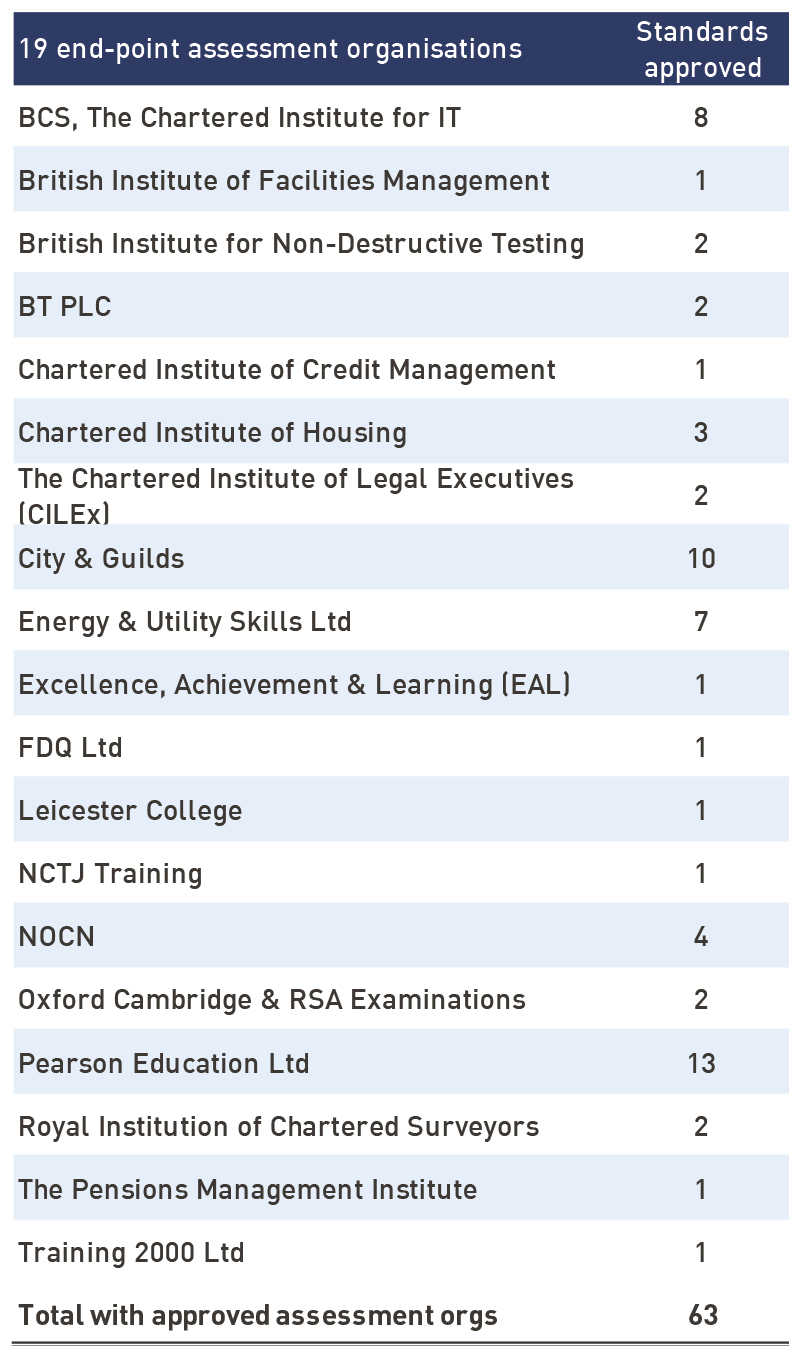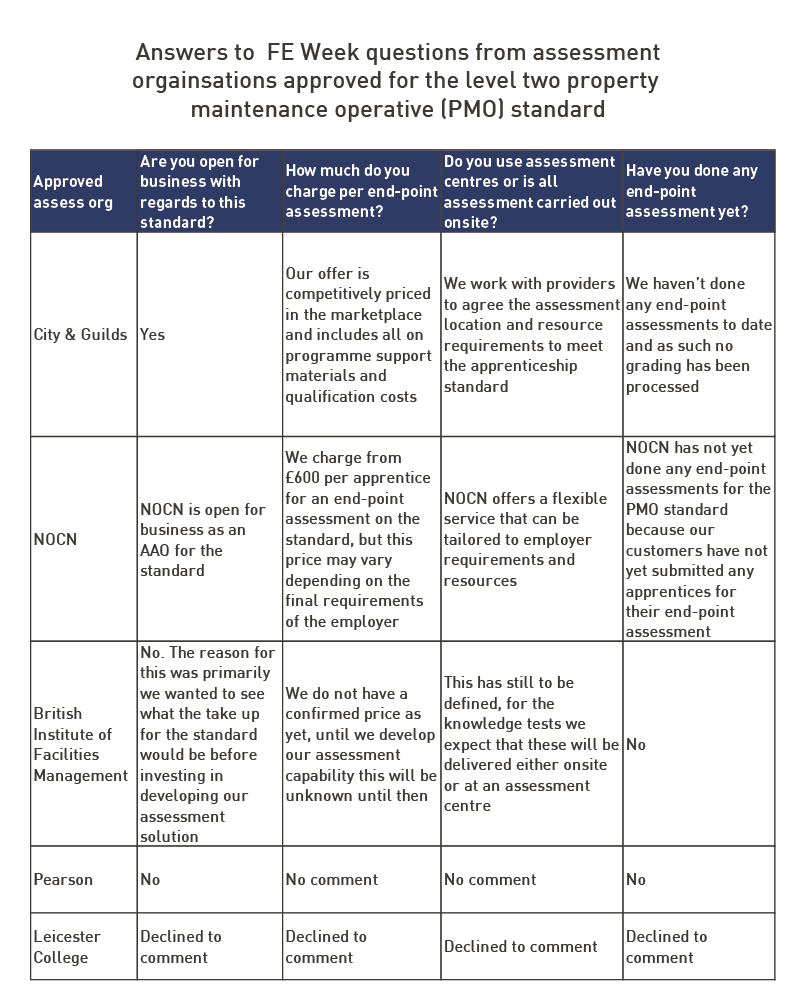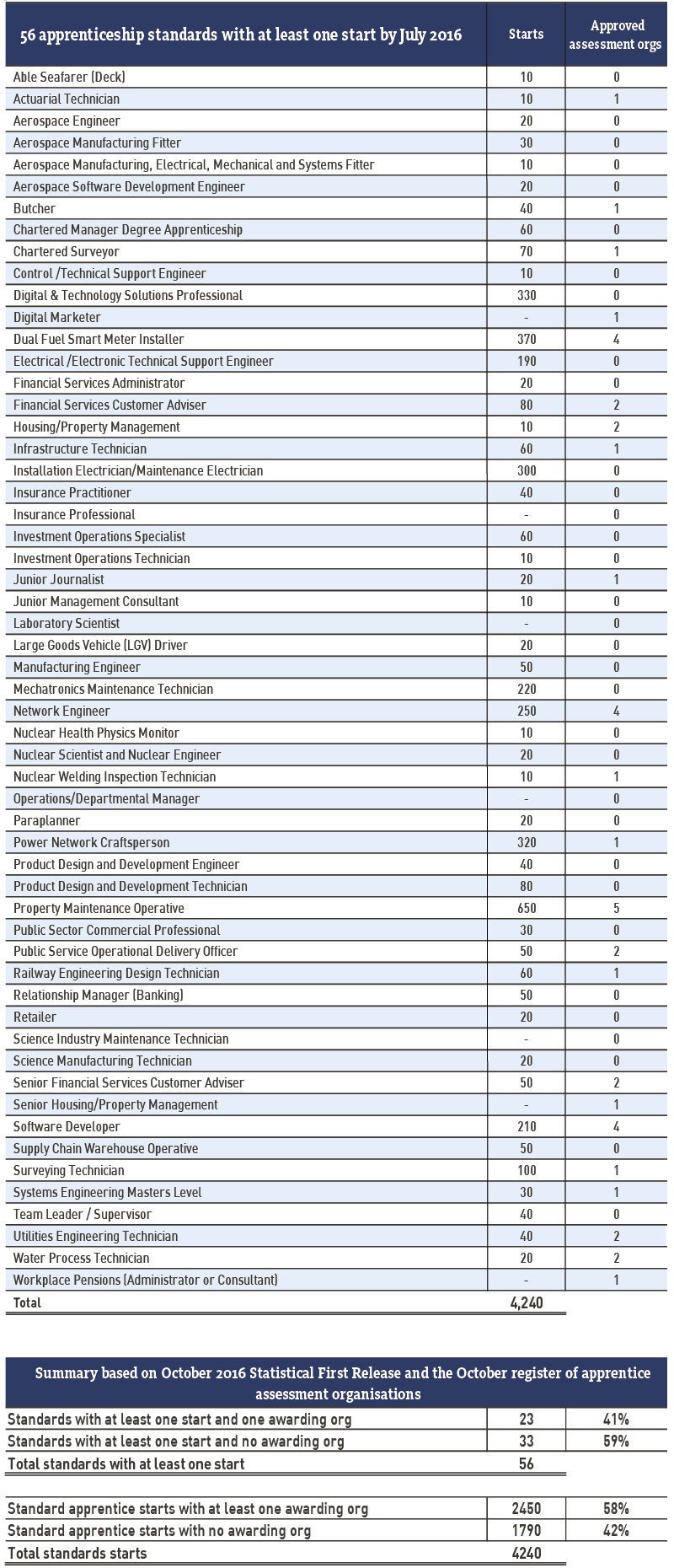A former top skills civil servant has turned on “diabolical” government planners, after exclusive FE Week analysis showed there are no approved awarding organisations for over 40 per cent of learner starts on new apprenticeship standards.
Number crunching of government data published this month showed this applies to 1,790 (42 per cent) out of the total number or starts (4,240) so far on the employer-developed programmes.
The revelation provoked scathing criticism from Dr Sue Pember, who stood down as the civil service head of further education and skills investment in February 2013, with the government also admitting there’s a problem.
It’s a serious issue because apprentices on the standards, which will gradually replace old frameworks, will have to pass end-point assessments for the first time.

They must be carried out by organisations that have been cleared for the task by the government, on the Skills Funding Agencies register of apprentice assessment organisations.
But as well as the startling figure for learners, our analysis also highlighted 33 standards with at least one start but no-one assigned to run their crucial tests.
Dr Pember said: “It is diabolical to let an apprentice start a programme, without explaining not only what the end test will contain, but where it will be, what shape it will take and who will be the organisation to oversee and manage the process.”
The Department for Education admitted on Thursday (October 13) that it is struggling to recruit enough of these assessment organisations.
“We know there is more work to be done to ensure we have the range and breadth of high quality assessment organisations we need,” the spokesman said.
“That is why we are working with the Skills Funding Agency to raise awareness of the register and encourage more assessment organisations to sign up.”
He added the level of demand for a standard was “one of the factors that will be taken into account when it comes up for review”.
“On top of this, we now require all groups of employers bidding to develop a standard to commit themselves to using it,” the spokesperson added.
The government has so far fully-approved 147 standards.
However, the October Statistical First Release reveals only 56 standards attracted one or more apprenticeship start by July, despite over 100 being available at the time. And of the 56 standards, a massive 59 per cent (the 33 highlighted above) still has no approved assessment organisation.
The government’s struggle to get to grips with the problem is being further exasperated because some of the assessment organisations are only allowed to operate in limited parts of the country.
Training 2000 Ltd and Leicester College are, for example, limited to the North West and West Midlands respectively.
FE Week has also got confirmation that at least two approved assessment organisations for the most popular standard, the level two property maintenance operative – which had attracted 650 learner starts by July – are not yet ready to deliver assessments (see boxout).
Dr Pember, who is currently director of policy for adult learning provider membership body Holex, joined the then-Department for Education and Skills in 2000 as director of adult basic skills strategy, before rapidly rising through the civil service ranks to the role of head of further education and skills investment by 2007.
She worked under ten FE and skills ministers and eight secretaries of state before leaving the civil service six years later.
The Association of Employment and Learning Providers (AELP) annual conference in June saw her previously speaking out on the issue of assessment.
She told delegates at the time: “I think it’s really morally wrong to start an apprentice on a programme when you don’t know how they are going to be tested at the end.
“You wouldn’t start somebody on the equivalent of an A-level without knowing the assessment at the end.”

And then I am worried about the equality issues, for example:



There appear to be two main points that come out of Sue Pember’s article in FE Week – ‘Lack of Assessment Organisations’, 17 October.
The first is that apprentices are currently being registered against new Apprenticeship Standards when there is no Apprenticeship Assessment Organisation (AAO) appointed.
We consider that apprentices should not be registered unless the Apprenticeship Standard has meet all the statutory requirements of the Enterprise Act 2016 – Schedule 4 A2G (1):
“A2G Examinations by independent third parties
(1) Before the IfA approves a standard or assessment plan for the purposes of section A2A(1) it must make arrangements for the carrying out of an examination of the standard or plan by an independent third party.”
We appreciate that these responsibilities are meant to be carried out by the IfA, under powers delegated by the SoS. As the IfA is not currently set up and operational the SoS should work to the duties the SoS plans to delegate to the IfA.
If the SoS were to do this then the concerns Sue Pember rightfully raises should be to dealt with, at least for any new Apprenticeship Standards.
The Government should implement some straight forward managerial controls as a matter of urgency:
1. No new registrations against Standards already approved, that do not have at least one AAO appointed, until such time as there is an approved AAO in place.
2. Work with employers and other organisations to appoint AAOs to the current approved Standards that do not have an AAO.
3. Ensure potential AAOs are engaged early on in the process for developing new Standards, before agreeing to the Standard being developed.
4. No registrations against new Standards until at least one AAO has been approved i.e. work to A2G (1) of the Enterprise Act 2016.
The second issue which Sue raises is about the lack of AAOs.
We appreciate that some organisations may be holding back due to uncertainty over demand as well as the high level of upfront investment needed to obtain approval and then set up to deliver EPAs. The fact that on average, in our experience, it takes around 6 months for an organisation to gain approval for a single standard will also have an impact.
However it is our understanding that a significant number of organisations have applied, but not matched the Government’s criteria for approval. This would indicate that it is not necessarily a matter of willingness, but that organisations are having to adjust to a new set of requirements and this will inevitably take time.
Bearing in mind that there could eventually be some 2,000 Apprenticeship Standards, at the current rate of progress it could be around 100 years before we finish implementing the changes. This is unsustainable we need to radically rethink the implementation processes whilst retaining the integrity of the excellent policy changes the Government is quite rightly trying to achieve.
We also consider that we now need to ensure that the Post 16 Skills Plan implementation, which plans to use a similar approach to that used for Apprenticeship Reform, does not encounter similar implementation difficulties.
In our view there should be a more integrated approach to both Apprenticeship Reform and the Skill Plan. There should be a Single Skills System, encompassing the academic, technical education, apprenticeship and work-based including up-skilling routes. This needs to be under-pinned by a Skills Enhancement Strategy, based upon a career pathways model.
What strikes me is the pitifully low number of apprentices enrolled on ‘Standards’. Even though starts on Standards are <1% of all starts we're still being rushed by the SFA to embrace them. Yet the evidence in this report goes to show that there is a capacity issue. We have no idea if the new Standards are fit for purpose and no idea if there will be sufficient capacity. AELP suggest that the rush to phase out frameworks be reconsidered until we can implement the transition to Standards in a methodical, logical and evidence-based way. Seems to me this article backs up that stance.